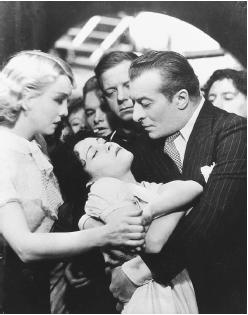
By Eric Jessen 7/20/09
Jean Renoir's camera frolics merrily around the courtyard, skipping and dancing from one star-crossed lover to the next, from the concierge's room to the printing office to the spiral staircase to the hall where friends and family share a drink. The courtyard is a congenial cheerful milieu with characters of all personalities, ready to laugh and sing the melodious dialogue from Jacques Prevert and Renoir's collaborative script.
In Le Crime de Monsieur Lange, Renoir has created a small community: Lange, our shy fool, Valentine, the pleasant savvy beauty, the drunkard who turns over the three trash cans, the innocent girl and the concierge's son sneaking a kiss by the stairs. No matter what their plight or misfortune, they all cherish their environment. They fear the depression that lurks outside. It's only when Lange commits his crime, that he and Valentine leave scared but hopeful. But maybe it's all for the better. Lovers, Lange and Valantine now have a chance to be alone together. Maybe Lange's crime and their departure is a gesture to their friends, forever making the courtyard the utopia of everyone's dreams.
The dialogue and the ambiance in Le Crime de monsieur Lange are splendid but the strength is also in the acting. Rene Lefevre as Lange, though timid and often boring to watch is perfect for the role. He is always daydreaming, ignoring the world and the women around him. Valentine says “your problem is you're always dreaming.” For most of the movie he is oblivious to Valentine's love for him. . Lange may be the only character who feels trapped in the courtyard. He dreams of the expansive areas, the open air, the freedom of the frontier. He writes a cowboy story series for the publishing company called “Arizona Jim.” (Reminding me of Holly's books in The Third Man).
Within our lovely town there was only one problem: the charming, conniving, deplorable yet lovable crook, Batala played by Jules Berry. He is the perfect villain. He smirks with the confidence of being a very successful manipulative thief, almost asking to be shot. But then in a flash he can seem like your friend. When Lange turns his cowboy fantasies to reality and finally shoots the villain Batala, it comes as a somewhat abrupt shock. I wondered, despite the answer being in the title, if Lange had the guts to shoot Batala. For a split second I thought perhaps Rene Lefevre had killed Jules Berry for stealing the show. Batala's death is one of the great scenes in all of Renoir's films. He falls gracefully. The camera spins, 360 degree pan, spinning and spinning around the courtyard: jarring yet refreshing, giving Batala and Jules Berry a well deserved exclamation point.
This movie is the work of a master in his prime. Other masterpieces were to follow: Sunday in the Country, Grand Illusion, The Rules of the Game. In Le Crime de Monsieur, Renoir captures the romanticism, beauty and joy of film.
No comments:
Post a Comment